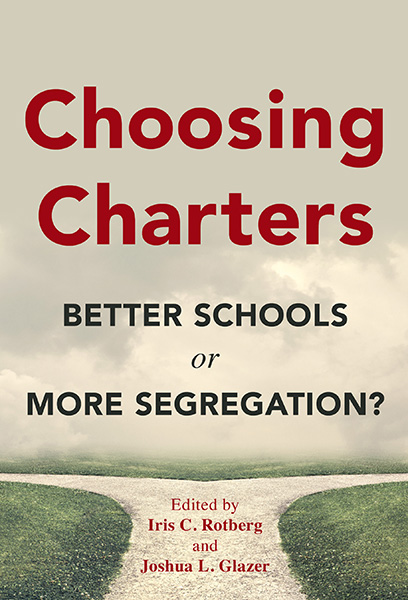Professors: Request an Exam Copy
Print copies available for US orders only. For orders outside the US, see our international distributors.
Edited by: Iris C. Rotberg, Joshua L. Glazer
Publication Date: March 30, 2018
Pages: 264

Do charter schools strengthen students’ educational experience? What are their social costs? This volume brings together a group of premier researchers to address questions about the purposes of charter schools and the role of public policy in shaping the educational agenda. Chapter authors explore topics seldom encountered in the current charter school debate, such as the challenges faced by charter schools in guaranteeing students civil rights and other legal protections; the educational and social implications of current instructional programs designed specifically for low-income and minority students; the use of charters as school turnaround agents; and other issues that lie at the intersection of education, politics, and social policy. Readers across the political spectrum, both supporters and critics of charter schools, can use this book to inform public policy about the ways in which charters affect diversity and inequality and the potential to devise policies that mitigate the most troublesome social costs of charter schools.
Book Features:
Iris C. Rotberg is a research professor of education policy and Joshua L. Glazer is an associate professor of education policy. They are both at the Graduate School of Education and Human Development at The George Washington University, Washington, DC.
“Iris Rotberg and Joshua Glazer have assembled a thought-provoking and timely volume on the topic of charter schools’ impact on diversity in education. The heterogeneity of a school’s student body is considered in terms of many different dimensions, including race, ethnicity, income, disability status, English language proficiency, culture, and religion, setting the stage for future research studies to continue tracking whether traditional public and public charter schools are becoming isolated along these lines. The contributing authors tackle tough questions, such as whether charter schools do an adequate job of supporting and serving students with special educational needs, the ways in which a school’s approach to student discipline can shape the composition of its student body, and the financial impact of chartering on district schools with significant fixed costs. A strength of the book’s approach is that the various contributors consider this issue at the intersection of other contemporary education reforms, including personalized learning models enabled by education technology and the ‘achievement school district’ model, which has been implemented in Tennessee, North Carolina, Louisiana, Mississippi, and Nevada.”
—Teachers College Record
"Readers across the political spectrum, both supporters and critics of charter schools, can use Choosing Charters to inform public policy about the ways in which charters affect diversity and inequality and the potential to devise policies that mitigate the most troublesome social costs of charter schools."
—Sir Read A Lot
“This is an excruciatingly important work. At this point in time, it is essential to understand whether and in what ways charter schools contribute to segregation – and how they might avoid doing so.”
—Mindy L. Kornhaber, Pennsylvania State University
Tentative Table of Contents
Acknowledgments
PART I: THE CONTEXT
Chapter 1. Setting the Stage
Iris C. Rotberg and Joshua L. Glazer
Chapter 2. Charter Schools in a Changing Political Landscape
Jeffrey R. Henig
3. Charter Schools in the Context of Poverty, Changing Demographics, and Segregation
James Harvey
PART II: CHOICES
Chapter 4. A School System Increasingly Separated
Iris C. Rotberg
Chapter 5. Shaping Charter Enrollment and Access: Practices, Responses, and Ramifications
Wagma Mommandi and Kevin Welner
Chapter 6. "Blended Learning": The Education Technology Industry and the New Segregation
Gordon Lafer
Chapter 7. Charter Schooling in a State-Run Turnaround District: Lessons from the Tennessee Achievement School District
Joshua L. Glazer, Diane Massell, and Matthew Malone
Chapter 8. Do Charter Schools Undermine Efforts to Create Racially and Socioeconomically Diverse Public Schools?
Roslyn Arlin Mickelson, Jason Giersch, Amy Hawn Nelson, and Martha Cecilia Bottia
Chapter 9. Do Charter Schools Strengthen Education in High-Poverty Urban Districts?
Adam Gamoran and Cristina M. Fernandez
Chapter 10. Civil Rights Protections for Students Enrolled in Charter Schools
Brenda Shum
Chapter 11. Church State Entanglement Within Charter Schools
Suzanne Eckes, Nina K. Buchanan, and Robert A. Fox
Chapter 12. How the Design of School Choice Can Further Integration
Jennifer B. Ayscue and Erica Frankenberg
PART III: EDUCATION IN A PLURALISTIC SOCIETY
Chapter 13. Charter Schools: Rending or Mending a Nation
Henry M. Levin
Chapter 14. The Problem We All Still Live With: Neo-Plessyism and School-Choice Policies in the Post-Obama Era
Janelle Scott
Chapter 15. Concluding Thoughts on Choice and Segregation
Iris C. Rotberg and Joshua L. Glazer
About the Editors and Contributors
Index
Professors: Request an Exam Copy
Print copies available for US orders only. For orders outside the US, see our international distributors.